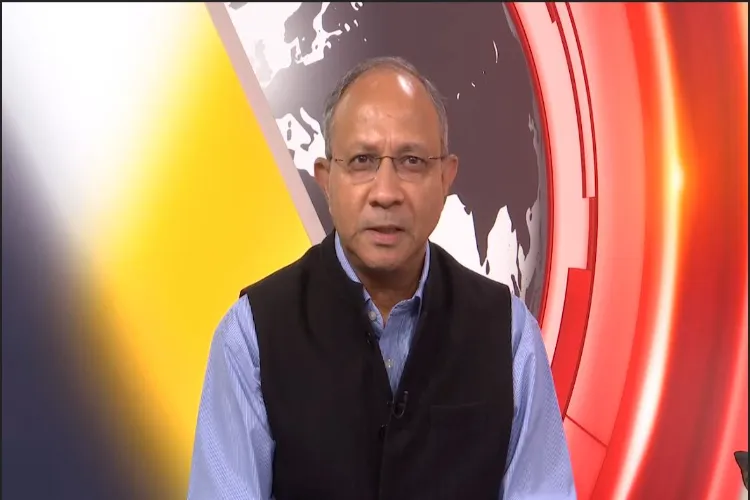
Tripti Nath/New Delhi
“India will not allow Pakistan to hold it back in the noble task of integrating the region and making it more prosperous and more secure,” said former Deputy National Security Advisor Pankaj Saran.
Ambassador Saran said this while hosting the fortnightly show’ Around the world with Ambassador Pankaj Saran’ on Awaz-theVoice portal.
Airing his views on India’s Neighbourhood First Policy’, Saran said, " We have tried to build a region around us of the Indian subcontinent which can move forward with India on the path of safety, security and prosperity.'' While agreeing that many of the initiatives taken by SAARC failed to materialize, he held Pakistan accountable for its obduracy to allow normal SAARC institutions and initiatives to go forward.
He said, “In Pakistan’s blinding hostility to India, it was willing to sacrifice the noble objectives of SAARC. The last SAARC summit was held in 2014 in Nepal which PM Modi attended.’’
Saran said, “In India, the view is not to wait for SAARC to move its agenda forward if other countries are willing to move much faster with us in their relationship. India’s approach of creating the coalition of the willing is showing concrete results on the ground. Because of the success of the Neighbourhood First policy and the way it is being reciprocated, today no one is missing SAARC in India and the region.’’
He said that the Neighbourhood First policy has succeeded in protecting India’s security interests. “India’s security is non-negotiable.’’
He said that the purpose of SAARC was to promote subcontinental integration among all the countries of South Asia. “Of course, we are members of SAARC and when conditions are right, we will go forward with it.’’
Replying to a question, Saran clarified that India does not want to be a big brother. “That is not the objective of the Neighbourhood First policy. India only wants to be an honest and genuine partner in the region.’’He added that India wants to build with its neighbors a partnership based on trust, equality, non- interference and ensure that we are all safe and secure.
The former envoy said that India’s overtures to Pakistan were not properly understood.“When PM visited Lahore in 2015, he was making a big statement but the Pakistani establishment misunderstood that gesture. Unfortunately, we find after the Prime Minister’s visit to Pakistan, we saw Uri, Pathankot and Pulwama. Forces in Pakistan mounted terrorist attacks on Indian installations and that put the process back to square one. Then, the government decided to leave Pakistan alone.’’
Saran’s simple prescription to Pakistan is that the elite and the armed forces in Pakistan who make India policy need to come to terms on how they want to deal with India. "Pakistan has to change its strategic mindset. History has shown that the path Pakistan has followed so far is not good for them. Pakistan has been the hotbed of global terrorism for three decades. ‘’
He added, “We have done nothing to Pakistan.’’ He said that in 2019, all that India did was amend the Indian Constitution and that led to incomprehensible furore in Pakistan. Till Pakistan is walking on the path of terrorism and using Kashmir as a means to whip up anti Indian hysteria and then also saying they are ready for a dialogue. It does not work that way. Pakistan needs a structural change.’’
He said that Narendra Modi’s invitation to leaders of South Asian countries for his swearing in ceremony in May, 2014 was historic, bold and indicated a very powerful sentiment on the part of the elected government. “All the South Asian leaders reciprocated and attended the ceremony. As Prime Minister, Narendra Modi has visited every single neighbour of India- some even more than once.
Saran said that India’s Neighbourhood First policy has moved very fast. “We have a complex neighbourhood but India has achieved good results. India has tailor-made its approaches to each neighbour differently.''The seasoned diplomat elaborated upon India’s assistance to Afghanistan, Nepal and Sri Lanka, “India has spent three billion dollars to build the infrastructure of Afghanistan. India was the first to assist Nepal when it had a massive earthquake in 2015. India has lent almost close to 4 billion dollars to Sri Lanka recently when had a financial emergency.
He said that India’s relationship with Myanmar has increased very significantly. “The security of the northeast is very closely linked to a secure and peaceful border between India and Myanmar
He added, “ The Neighbourhood First Policy has a very good framework. We have had some very good success stories. Bangladesh is one of the best success stories.’’
He cautioned that there is far too much going on in Afghanistan that still is very uncomfortable for India. He added that some aspects of Pakistan’s relationship with China are a serious threat to India.
Saran drew attention to the way India reached out to its neighbours during the COVID 19 pandemic (January and April of 2021). “The Prime Minister also announced the creation of a SAARC COVID Emergency Fund and India put in 10 million dollars. Others also contributed but Pakistan did not.
''Replying to a question, Saran described Prime Minister Sheikh Hasina’s recent India visit as “excellent.’’He said, “What Prime Minister Sheikh Hasina has done for Bangladesh’s development and its ties with India, is extraordinary. Sheikh Hasina believes that a good relationship with India is actually in Bangladesh’s interests. In this visit, the outcome on sharing of the Kushiyara river, is a good development.
He said, “I’m happy to see that India has decided to invite Bangladesh for the G 20 summit. India is institutionalising a lot of initiatives it is taking with Bangladesh. In the past 15-20 years, our trade with each of our neighbours except Pakistan has grown significantly and the biggest change has come in the case of Bangladesh.’’
